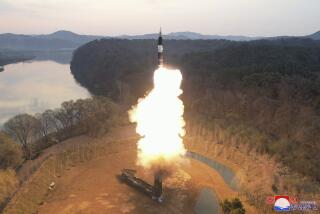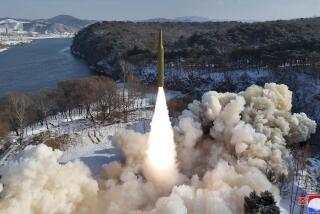North Korea still a long way from a reliable weapon, experts say
As news broke of North Korea’s successful launch of a long-range rocket on Wednesday, alarm bells went off around the world. The technology used to send a satellite into orbit or fire a missile carrying a warhead are basically the same, raising fears that the Wednesday launch could be the next step toward a missile system capable of hitting the United States.
But experts caution that a single successful launch is still a long way from a dependable missile, especially if North Korea is angling to deliver a nuclear weapon. North Korea still must test its technology over and over to ensure it is reliable. It must be able to fire it at any time. And it must adapt the same systems to the added rigors and risks of a weapons launch.
“If you have a weapon, you can’t say, ‘Right now it’s windy, so please don’t fire on our country until next week,’” said Markus Schiller of the German consulting company Schmucker Technologie. “You have to be able to push a button and it goes off.”
North Korea has had a poor track record with its past satellite launches. In 1998, North Korea launched a small rocket over Japan and claimed to have sent a satellite circling the Earth, but Western officials said no trace of a satellite was ever found. Eight years later, North Korea launched a much larger rocket that failed just 40 seconds after liftoff.
Its next attempted launch in 2009 fared somewhat better: Western officials say it failed during its third and final stage, which was supposed to propel the satellite into orbit. North Korean state propaganda nonetheless boasted a satellite was circling the Earth and broadcasting songs in praise of Kim Il Sung and Kim Jong Il, the nation’s founder and his then-ruling son.
The last launch was in April, when a rocket flew for less than two minutes before breaking into pieces and falling in the Yellow Sea. The rapid failure was an embarrassment to North Korea, not even matching the progress of its last launch. The government publicly recognized the failure.
Outside experts are still debating what went wrong during the April launch. A Kyodo News report that cited Japanese government officials claimed the rocket veered east immediately after liftoff and the second stage failed to ignite. That might suggest that the four engines firing during the first stage did not work compatibly with one another, pulling the rocket off course.
“The country is a black box, but if you had to make an informed guess, the fact that it flew successfully [before] suggests a problem with the reliability of the construction” rather than a flaw in the design itself, said Ted Postol, a Massachusetts Institute of Technology professor of science, technology and national security policy. “These rockets are just not forgiving.”
The decision to attempt another mission so quickly after the April failure spurred speculation that the timing was driven by political demands rather than engineering realities. The short time between the launches – much less than North Korea had afforded itself in the past – had left many analysts skeptical that engineers had had time to fix problems.
After the Wednesday launch, North Korea again claimed it had sent a satellite into orbit; this time, Western officials said an object appeared to be in orbit. Yet even after their Wednesday triumph, some experts say North Korea still might not have pinpointed what went wrong in April, but simply decided to press forward and see if it worked.
Experts said there were no dramatic differences between the last, failed launch and the Wednesday success; North Korean officials said they were planning to use the same models of satellite and launcher and again sent the rocket southward, instead of east in the direction of Japan.
Either North Korean engineers quickly assessed their failures and corrected them or “engineers decided to launch a similar model and hope for the best,” said Michael Elleman, a senior fellow at the International Institute for Strategic Studies in Bahrain. “The former is less likely, mostly because North Korea has very limited experience testing missiles or space launchers.”
That bigger uncertainty points to the main challenge ahead of North Korea if it wants to use this technology to threaten its foes. The stakes for a weapon are high.
“The last thing you want to do is put a nuclear weapon on something that has a high chance of exploding on the launch pad or dropping into the water,” said David Wright, an arms control expert with the Union of Concerned Scientists.
Unlike sending up a satellite, which can be done whenever the weather is smooth, a weapon must be ready at any time. To be sure that a missile is reliable, most countries test them at least a dozen times; countries with less experience may test them as many as 40 or 50 times. Such testing requires at least three years and often takes longer than five, Elleman said.
Adapting the same technology to launch a missile also demands some added engineering feats: Elleman pointed out that the payload on a ballistic missile must survive the heat and vibration of reentering the atmosphere, a challenge that engineers don’t face when sending a satellite into space.
If North Korea wanted to fire a nuclear weapon, experts believe it still needs to fashion one small enough to fit onto a missile. Schiller added that the existing firepower does not appear to be enough to send something as heavy as a nuclear weapon as far as North Korea would want.
Although experts say North Korea still has years to go before it could threaten the United States with a missile, they warn that its strides are nonetheless worrisome.
“Nothing seems to be stopping them and they are clearly making progress,” said Marcus Noland, deputy director and senior fellow at the Peterson Institute for International Economics. “If nothing changes we could be facing a situation in a few years where they could deliver a nuclear warhead onto Los Angeles.”
“I don’t want to overhype this,” Noland added quickly. “It’s years away. It’s not imminent. But this is not a good trajectory that we’re on.”
ALSO:
North Korea rocket launch seen as successful
Egypt’s opposition urges followers to vote ‘no’ on referendum
North Korea’s rocket expenditures could have helped the hungry
More to Read
Start your day right
Sign up for Essential California for news, features and recommendations from the L.A. Times and beyond in your inbox six days a week.
You may occasionally receive promotional content from the Los Angeles Times.






